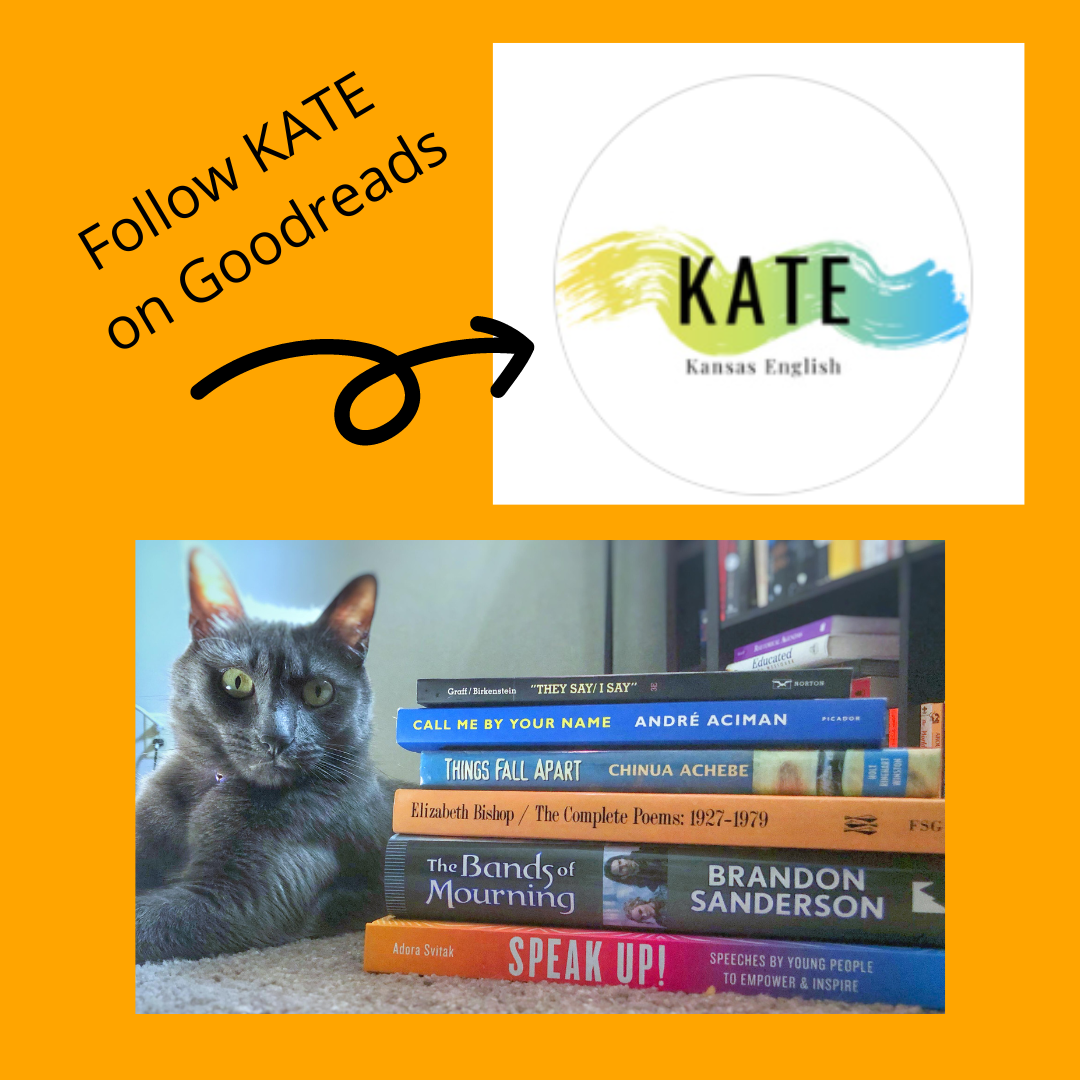 Here’s a Jeopardy question for you. Category: Fun Things for FREE (with your KATE membership). Answer: A discussion focusing on 49 different books ranging from graphic memoirs to poetry. Question: What is the KATE summer book tasting? If you love books, and we know you do, you would have loved the KATE summer book tasting. Throughout the year, KATE hosts similar events such as book clubs and CoffeeEdu Zoom chats. You can learn about upcoming get togethers in the KATE monthly newsletter, on the KATE website and through our Facebook group. These casual meetings help us get to know each other, lead to collaboration, and create wonderful teacher friendships. The June 11th summer book tasting also provided a huge list of book recs. You should know that this list of forty-nine titles was generated in about an hour by four teachers discussing our reading experiences. The topic prompts for this Zoom chat included books we studied in class this past year, our personal reads for the summer, and books we are excited about for next year. For the most part, we stuck to the plan, but as you’ll see, the list is varied and spans quite a range of genres. After a few feeble attempts to organize the list for your perusal, we gave up. We free-associated this list with the energy of a teacher-tired summer brain coupled with stream of consciousness and puns. We hope you enjoy these books as much as we do! Let’s start with the King and the Dragonflies (by Kacen Callender) and also Lord the regular housefly, I guess. Or maybe it’s an island fly. Nevertheless, it’s Lord of the Flies (by William Golding). Then there’s Damselfly (by Chandra Prassad) and Fly Girls (by Keith O’Brien). Which leads us to Girls of the Atomic City (by Denise Kiernan) who might Jumpstart the World (by Catherine Ryan Hide). Picnic. Lightning. (by Billy Collins), Things Fall Apart (by Chinua Achebe), Unbroken (by Laura Hillenbrand), and Bands of Mourning (by Brandon Sanderson). Followed, or maybe preceded by Twelve Years a Slave (by Solomon Northrup) and 1984 (by George Orwell), which is quite the Saga (by Brian K. Vaughn). Let’s segue into American Born Chinese (by Gene Luen Yang) and Vietnamerica (by GB Tran), and then a little Reading Lolita in Tehran (by Azar Nafisi). Speaking of Lolita (by Vladimir Nabokov), that’s a book and half, isn’t it? Even if you haven’t read it, you know the name. It’s not a name most of us would like to be called. Even Lolita might demand, Call Me By Your Name (by Andre Aciman). Or any other name. How about Antigone, (by Sophocles) or The Great Gatsby (by F. Scott Fitzgerald), or Felix Ever After (by Kasen Callender), or George/Melissa (by Alex Gino)? How about Elizabeth Bishop (Complete Poems 1927 to 1979)? Persepolis (by Marjane Satrapi) made our list, along with Running with Sherman (by Christopher McDougal). Whew. We’ve only covered half, so far. Oh well, you know what they say? No, you don’t? But you might know They Say/I Say (by Gerald Graff and Cathy Birkenstein), or Speak Up!: Speeches by Young People to Empower or Inspire (by Adora Svitak), or The Last Thing He Told Me (by Laura Dave). Which leads to They Called Us The Enemy (by George Takei), Rhetorical Agendas (by Patricia Bizzell), Understanding Comics (by Scott McCloud), No More Fake Reading (by Gordon Berit), Games of Deception (by Andrew Maraniss), Nothing Ever Dies by Viet Thanh Nguyen), and finally, for the love of all things bookish, Can We Talk About Something More Pleasant? (by Roz Chast). Yes, something more pleasant like Book Love (by Debbie Tung), The Perfect Horse (by Elizabeth Letts), Those Precious Days (by Ann Patchett), When the Moon Was Ours (by Anna-Marie McLemore), Years of Wonders (by Geraldine Brooks), Infinite Hope (by Ashley Bryan), Humankind (by Rutger Berman), and even The Dutch House (by Ann Patchett), which we have no idea whether it’s a nice place or not, but it sounds lovely. Because it is summer, maybe we should also talk about Why We Swim (by Bonnie Tsui), The House on the Cerulean Sea (by TJ Klune), Seabiscuit (by Laura Hillendbrand), The Boys in the Boat (by Daniel James Brown), or Cannery Row (by John Steinbeck). Row…see what we did there? Are you entertained yet? If you kept count, that’s forty-nine. We wish with all our hearts that someone had mentioned a book with the word cheese in the title because that word might sum up this post better than any others. In fact, why not round it up to an even fifty? Because our book tasters were all secondary or higher educators, we didn’t discuss any elementary level books, so we’re adding one. It is a favorite for younger kids. Everyone should experience it at least once, The Stinky Cheese Man (by Lane Smith). We understand that we have tortured through this blog. You deserve a reward for sticking it out. Your reward is not to move onto the Double Jeopardy round in hopes of winning thousands of dollars, though. No, your reward is better than that. We asked the book tasters to choose a couple of these tasty morsels and dive in a little deeper for you. And yes, we mixed our metaphors. It’s summer. We're allowed. Read on for the morsel diving. For Nathan Whitman, KATE president: For my own teaching and improvement, I'm going to be looking at "They Say / I Say" (Graff and Birkenstein), which is a text on how to frame and learn argumentation through extensive modeling. As it's my first year teaching AP Language and Composition, I think it'll be handy for my students to have a toolbox of linguistic frameworks as they work towards the end of course exam. Additionally, for my Pre-AP English 10 students' future, I'm excited to further read more of Speak Up! (Svitak) and its speeches by teenagers. I hope it'll help me see the world more through my students' eyes and find ways to help them develop rhetorical argumentation skills on topics that are relevant. It'll be my first time including Chinua Achebe's Things Fall Apart in Pre-AP English 10, so that's also on my to-read list for the summer, and I'm looking forward to reading it from the lens of a tragedy, as KATE Summer Book Tasting attendee Steve Maack recommended. I hope that it'll not only unlock the text for myself but also for my students. For myself, summer is the time for creative writing, poetry, and whittling away at the to-read list. For June, I'm trying to work through as many LGBT+ texts as possible. My present reading is Call Me By Your Name (Aciman). It's always fascinating to see differences from film to text, and one thing that surprised me within the first two chapters is how the protagonist is probably bisexual. The film depicts him more as just angsty and using girls for cover. My bedtime read is The Bands of Mourning (Sanderson). If I'm to keep up with the prolific Sanderson, I've got to read at least a few of his books per year. He's giving Stephen King a run for his money on interconnected universes and characters. And I thought keeping track of all of my students' ever-changing relationships was difficult! To fit in some inspiration for my poetic muse and knock another queer writer off the list, I've also decided to revisit a text assigned in college by Elizabeth Bishop. Since we only read a few of her poems in class, I'm enjoying reading through the full compendium of her work. From Katie Cramer, Kansas English Editor Kacen Callender is the author of several award-winning middle-grades and young adult novels, including Felix Ever After and King and the Dragonflies, which won the National Book Award for young people’s literature in 2020. Callender identifies as Black, queer, and transgender and writes about these intersecting identities in their work for middle and high school readers. They don’t share a lot about themselves on social media, but you can learn more about them and their books at KacenClaendar.com. From Deborah McNemee, KATE Blogger The complete title is Games of Deception: The True Story of the First U.S. Olympic Basketball Team at the 1936 Olympics in Hitler's Germany. We added it to our World War II non-fiction book circles a couple of years ago. Students loved it so much, we had to double our inventory. This book does a lot. It tells the story of the invention of the game of basketball, it relates instances of racial and gender injustice associated with Hitler’s Olympics, and also chronicles the exciting journey of a few boys from McPherson, Kansas as they journey to Germany to make sports history by becoming not only the first US Olympic basketball team but also the first gold medal winners for that sport. Any book that can engage students with these important concepts is a good one. Here’s something even better, I happen to know that the author will video chat with your class. This blog is full of goodness but very long, so we’ll end it. Thank you for playing. For more book recs, follow the KATE on Goodreads.
0 Comments
|
Message from the EditorWelcome! We're glad you are here! Archives
April 2024
Categories
All
|

 RSS Feed
RSS Feed